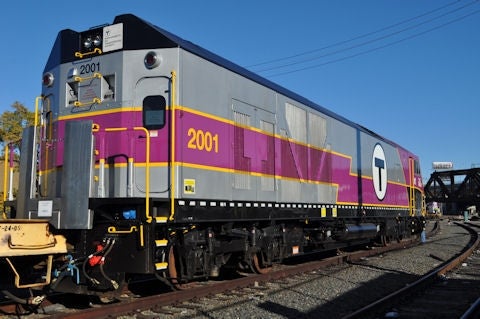The MBTA’s fleet of commuter rail locomotives, including 40 new cars, poses “challenges” for the vendor tasked with operating the 388-mile system that has an annual ridership of 35 million and ongoing reliability problems.
David Scorey, who now manages the railroad vendor, said system maintenance and equipment availability are the biggest issues as he seeks to improve reliability and bring the vendor Keolis Commuter Services close to profitability.
Scorey grew up in Wales, started making repairs to trains three decades ago at the age of 22, and recently met with the News Service for a half hour at the international company’s Boston offices.
Fifty of the operating locomotives are old and “need quite a lot of care and attention” to keep them functioning, while the 40 newer locomotives have their own challenges, said Scorey, general manager of the company.
“There are still some issues to deal with with that fleet. We’ve seen a number of turbocharger failures, which is a fairly significant failure when it happens. The wheels on the fleet do need quite a lot of care and attention to keep them in good order,” Scorey said, noting problems with traction motors and electrical encasements. He said, “There’s no complaints. We are here to manage that fleet.”
The T purchased the 40 locomotives from MotivePower Inc. at a cost of $222 million under a 2010 contract, and the first locomotive went into service in 2014, according to the MBTA. According to the T, 37 of the commuter rail locomotives are beyond their 25-year service life.
Under the contract, the MBTA buys and owns the equipment while Keolis maintains it. The T is also responsible for the commuter rail’s mobile ticketing app, which has been dysfunctional for some customers, and wifi, which experiences outages.
MBTA spokesman Joe Pesaturo said he expects mobile ticket vendor Masabi to update the app this week. Pesaturo said the wifi is “anchored by traditional cellular technology” and susceptible to the same signal losses as cell phones. He said the T has been working with inMOTION to bring a stand-alone wifi system online for the commuter rail – with South and North stations and Back Bay expected to be online by the end of the year.
In July 2014, the MBTA said that inMOTION would “install, operate, and maintain a neutral, private, and dedicated WiFi network on all MBTA passenger coaches and ferries.” At the time, the T said that installation work would begin in the fall of 2014, and the full system would be in place within 18 months.
After working as managing director of Southern Railway in the United Kingdom, Scorey this year took over as general manager of Keolis Commuter Services, which has 2,261 employees including 246 in management. Gerald Francis, the former general manager, moved to the position of president of the company whose biggest North American client is the T.
“I’m really enthusiastic about the future,” Scorey said. He said, “It’s been a difficult year operationally for a number of reasons.”
A new commuter rail schedule introduced last May “stretches” the equipment and is “less forgiving” than the prior schedule while also offering more trains for riders, Scorey said. More than a month ago, a working group began meeting with passenger representatives seeking to develop better schedules that will likely take effect next spring, he said.
A Rapid Action Group working internally at Keolis aims to achieve more immediate service improvements on the Worcester Line, Scorey said. The Framingham/Worcester Line is both one of the busiest – with about 16,000 weekday riders – and one of the worst performing lines, with only 61 percent of trains on time in a recent 30-day period, according to Keolis.
Scorey said the current schedule does not account for a crossover near the construction of a new station in Brighton that adds about two to three minutes to each trip on the Worcester line.
More than two years into its contract with the MBTA, Keolis has failed to turn a profit, losing tens of millions of dollars and requiring investments from its parent company. Along with safety, reliability and worker satisfaction improvements, breaking even financially is the company’s target for the year starting in January.
“What I’d like to say we’ve achieved is the highest levels of performance and safety that’s ever been delivered on this network,” said Scorey, envisioning his ideal retrospective view in December 2017. “I’d like to say that we’ve achieved our target of breaking even next year, and I’d like to say that we’ve continued to evolve the way our workforce works, and the level of enjoyment they get from their roles, the level of engagement they feel from the company.”
The MBTA and Keolis in July agreed to a contract adjustment, requiring Keolis to provide additional train maintenance and hire conductors, which T management said would improve service, along with an additional $66 million for Keolis over the remainder of its eight-year $2.69 billion contract. Unlike the contract as a whole, the company is making a small profit on that new work, Scorey said.
Scorey said it is natural for adjustments to be made to an agreement over time.
“The core of the contract will remain largely as it is but around the fringes of it things do come in and out,” Scorey said. Keolis has previously proposed altering the financial arrangements around fare collection and Scorey said the company is “at the latter stages” of planning for fare gates at certain stations to improve fare payments.

